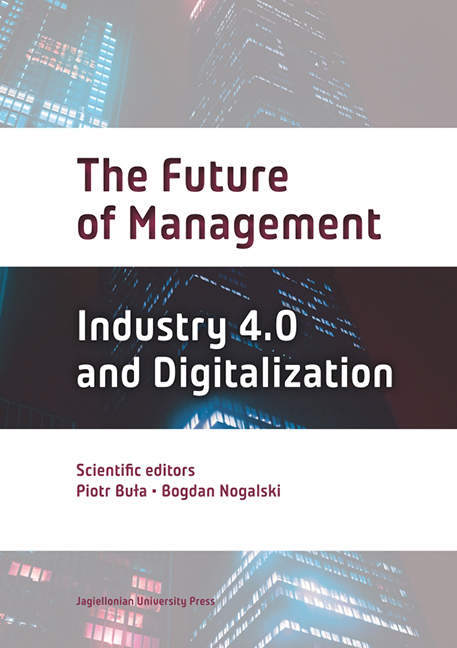Book contents
- Frontmatter
- Contents
- Preface
- Industry 4.0: Social Impacts and Operations Management Challenges
- Business Model Changes in the Presence of Challenges Brought by Industry 4.0
- Communication in Traditional and Network Organisation: Transformation
- Consequences of the Fourth Industrial Revolution in Social and Economic Development in the 21st Century
- Ideology, Trust, and Spirituality: A Framework for Management Control Research in the Era of Industry 4.0
- Renewable Energy through Industry 4.0 on the Example of Photovoltaic Development in Selected European Countries
- Employee Loyalty in the ICT Sector as a Challenge for Building Industry 4.0
- The Importance of Flexibility of Human, Tangible and Intangible Resources in Selected Production Entrepreneurships: Results of Empirical Research
- Challenges Posed for Universities by the Industry 4.0 Environment
- Big Data in Managing Marketing Communication
- Mathematical Risk Assessment Method in the Implementation of Logistic Processes
- Management and Digitisation
- Branding of Time as a New Direction in Tomorrow’s Management
- The Future of Branding
Industry 4.0: Social Impacts and Operations Management Challenges
Published online by Cambridge University Press: 16 November 2021
- Frontmatter
- Contents
- Preface
- Industry 4.0: Social Impacts and Operations Management Challenges
- Business Model Changes in the Presence of Challenges Brought by Industry 4.0
- Communication in Traditional and Network Organisation: Transformation
- Consequences of the Fourth Industrial Revolution in Social and Economic Development in the 21st Century
- Ideology, Trust, and Spirituality: A Framework for Management Control Research in the Era of Industry 4.0
- Renewable Energy through Industry 4.0 on the Example of Photovoltaic Development in Selected European Countries
- Employee Loyalty in the ICT Sector as a Challenge for Building Industry 4.0
- The Importance of Flexibility of Human, Tangible and Intangible Resources in Selected Production Entrepreneurships: Results of Empirical Research
- Challenges Posed for Universities by the Industry 4.0 Environment
- Big Data in Managing Marketing Communication
- Mathematical Risk Assessment Method in the Implementation of Logistic Processes
- Management and Digitisation
- Branding of Time as a New Direction in Tomorrow’s Management
- The Future of Branding
Summary
Abstract
The new Industry 4.0 is designed to respond to major global challenges, such as global warming, ageing population, globalisation, deregulation, depletion of raw materials, growth of the young (born digital) generation with rising demands and expectations, political frictions, economic growth uncertainties, social unrest, mass migrations, etc. On the reverse side—the Industry 4.0, which is to meet new expectations also has its dark side if not managed wisely with a human-centred focus. It is the set of social costs of transition. In such settings corporate leaders attempt to rethink not only the winning logic of competitiveness but also with whom and how they have to cooperate “in the crafting of a new societal deal that helps individuals cope with disruptive technological change.”
Facing up to the Fourth Revolution is the major challenge for managers in their professional career in the industry. They have to find their way of managing transition from the past routines and present problems to brand new reality to be invented and constructed, based on the innovations offered by technology revolution with its overwhelming disruptive power and competition based on the Amazon Effect.
In this article focus will be put on the transition process to be navigated by three types of companies: old fashioned and lagging behind the new stream of inventions, adopting new technology in a human-friendly way, and new-born entrepreneurial digital platform companies. For all of them, the key success factor is accelerated and focused education.
Keywords: industry revolution, innovations, cyber security, retail, digitalisation
Industrial revolutions: Change of technologies, products and mindset
From a historical perspective, Revolution 4.0 is the natural step ahead on the road of achievements and shortages of previous revolutions to meet the evolving needs of the growing global population.
The already existing applications for the industrial sectors of the economy represent a broad range of new possibilities, such as “predictive maintenance, improved decision-making in real time, anticipating inventory based on production, improved coordination among jobs, etc. Day after day, all these improvements are gradually optimizing production tools and revealing endless possibilities for the future of Industry 4.0.”
Adaptability and agility become the distinctive features of Industry 4.0 in view of dramatically changing conditions.
- Type
- Chapter
- Information
- The Future of ManagementVolume Two: Industry 4.0 and Digitalization, pp. 9 - 21Publisher: Jagiellonian University PressPrint publication year: 2022

